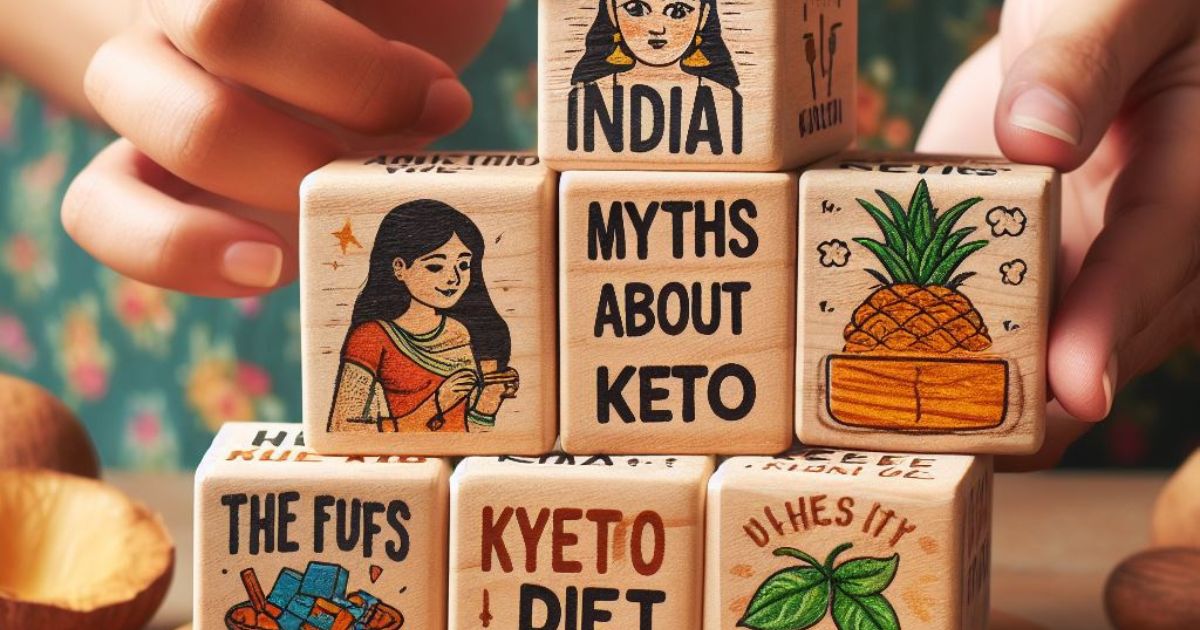Last updated on December 5, 2023
The ketogenic diet, often simply referred to as Keto diet, has gained immense popularity worldwide, including in India. However, there are countless and ever-evolving myths associated with Keto diet in India.
In my last 8+ Keto coaching years, I have read and heard many bizarre myths and claims about ineffectiveness (or effectiveness) of Keto diet on people of Indian subcontinent. In this blog post, I’ll address some of the most prevalent Keto myths and provide clarity.
Keto diet is incompatible with Indian diet
While it is true that Indian foods and recipes are loved across the globe for their vibrant flavours and fragrant spices, they are also high in carbs, calories, and trans fat and low in protein and fiber content. These features make Indian diet unsuitable for a Keto diet.
But it does not mean that we can’t follow Keto diet in India. With a few tweaks and customizations, Indian recipes can be transformed into Keto-friendly options.
I have made certain tweaks/customization in Indian foods and recipes to make them compatible with Low-Carb High Fat (LCHF) Keto diet. For more than an 8 years now, I have crafted hundreds of recipes — that are customized for LCHF based Keto diet — and coached thousands of people on their keto journeys.
Keto diet is not for Indian vegetarians
Contrary to popular belief, India is a meat-eating country. Only 29% of the total population follow a vegetarian diet. Even if you are a vegetarian living in India, you can still follow a ketogenic diet plan.
The Indian vegetarian recipes can be customized to make it amenable with rules of Keto diet. I have experimented a lot of Indian vegetables to create vegetarian Keto recipes, and I’d recommend you start with low-carb Indian vegetable such as cauliflower, capsicum, spinach, and broccoli.
Keto is just for weight loss
I do get most queries about weight loss benefits of Keto diet and most people get pleasantly surprised when I tell them additional benefits of following a ketogenic diet regime.
Keto diet is primarily designed for weight loss, there are also a number of other potential benefits of the Keto diet, such as:
- Blood sugar control: As keto diet reduces the need for insulin, help to improve blood sugar control in people with type 2 diabetes. This is significant as India is home to over 7% (101 million) diabetic patients.
- Improves brain health: Keto diet improves brain function, and it is used to treat neurocognitive diseases and neurodegenerative diseases like Epilepsy, Alzheimer’s and Parkinson’s.
- Improves fertility outcomes in women with PCOS: Keto diet was found to help in lowering testosterone levels in women with PCOS and leading to improvement in their fertility outcomes.
Keto diet causes muscle loss
I’d say describe it as conditional truth. It is possible that you may lose some muscle mass while on a Keto diet, but it is dependent on factors such as:
- Protein intake
- Strength training workouts
- Sleep
- Electrolyte consumption
- Lifestyle
The muscle loss can be mitigated to negligible level if you:
- Take enough protein (consult a Keto dietician to know your per day protein intake)
- Incorporate strength training workouts in your daily routine.
- Get enough (at least 8 hour) sleep.
- Consume electrolyte drinks on a regular basis.
Keto diet is expensive
It is a common misconception that Keto diet is pricer than the other diets (Paleo, Vegan, etc.) In a study conducted by finder, it was found that Keto diet is the most budget friendly diet in the United States.
While no such study has been conducted in India yet, finding of the study are still relevant to the Indian context. The cost of the Keto diet foods varies depending on individual food choices, location, and shopping habits.










